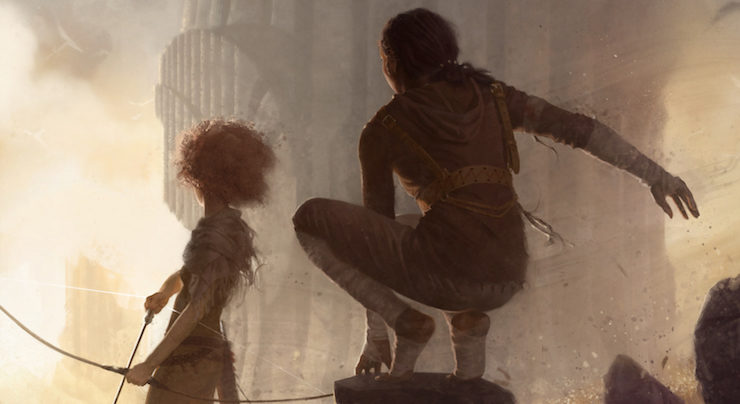For nearly two decades, Jim Killen has served as the science fiction and fantasy book buyer for Barnes & Noble. Every month on Tor.com and the B&N Sci-Fi & Fantasy Blog, Jim shares his curated list of the month’s can’t-miss new SFF releases.
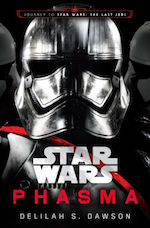 Phasma, by Delilah S. Dawson
Phasma, by Delilah S. Dawson
(September 1, LucasBooks—Hardcover)
Star Wars: The Force Awakens introduced a ton of instantly iconic new characters, but none more mysterious and enigmatic than First Order military leader Captain Phasma. She became a fan favorite even before the movie came out—and sadly gave her far too little attention. That’s to be rectified in this novel, penned by one of our favorite SFF writers, Delilah S. Dawson—who knows from creating strong, complex characters. Here, she offers us the irresistible chance to learn more about the fearsome stormtrooper whose history has remained a total mystery, until now. Cardinal, a crimson-armored stromtrooper, hates Phasma and seeks to uncover the secrets of her past by torturing a rebel prisoner. The prisoner and Cardinal become locked in a battle of wills as information is bargained away a piece at a time, slowly filling the blanks of Phasma’s origin story—but once Cardinal knows the truth, he’ll have to deal with the raw power of Phasma’s fury. The Barnes & Noble edition features an exclusive double-sided poster.
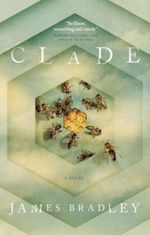 Clade, by James Bradley
Clade, by James Bradley
(September 5, Titan—Paperback)
The Hollywood version of climate change is sudden, dramatic, and instantly cataclysmic; Bradley’s thoughtful near-future sci-fi offers the opposite. With a time-hopping narrative focusing on a single family across years, Bradley explores a world struggling with the effects of rising temperatures that cause fierce, constant storms, battered infrastructure, and widespread extinctions. Adam is a climate scientist working on the arctic ice shelf, worried that the child his partner is pregnant with will enter a world already ruined. That child, Summer, grows up estranged from her parents as England faces collapse in the face of the relentless power of a boiling Earth. By avoiding the easy narrative, Bradley’s novel is absorbing and depressing, as it is thoughtful and fascinating, as he traces the possible paths of a future being seeded right now in the present day.
opens in a new window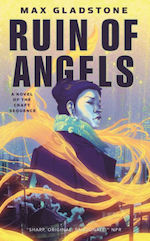 Ruin of Angels, by Max Gladstone
Ruin of Angels, by Max Gladstone
(September 5, Tor.com Publishing—Paperback)
Having hopped publishers, Max Gladstone’s Hugo-nominated Craft Sequence—a blend of epic and urban fantasy in which divine magical and disputes over zoning regulations go hand-in-hand—returns with a sixth installment that will satisfy old fans while welcoming new ones. Familiar faces return, but the setting is new: the city of Agdel Lex, which sits atop the wreckage of another, destroyed in the God Wars. It’s a place where streets shift without notice, tethered to one reality or another only by a shared understanding, while outside the city walls lie the writhing remains of dead and dying deities. Visitors must stay focused on the country to which they were admitted, lest they fall through holes in the façade and into the dead city. Into this strange landscape wanders Kai, a priestess on the hunt for her missing sister, soon caught up in a new war between the Iskari Rectification Authority’s mission to solidify Agdel Lex’s nebulous and tenuous foundation, and leagues of “delvers” looking to poke holes in it and find pathways back to the old city.
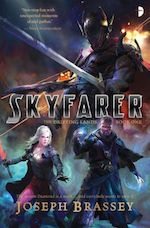 Skyfarer, by Joseph Brassey
Skyfarer, by Joseph Brassey
(September 5, Angry Robot—Paperback)
Inspired by the science fantasy of Star Wars, Final Fantasy, and Firefly, Brassey’s epic standalone debut pivots on the legendary Axiom Diamond, a gem that will show the bearer any truth they wish to see. Sought for centuries, the gem remains legend—but when Aimee de Laurent’s first attempt at casting a portal spell goes terribly wrong, she and the sorcerer she’s been training under are forced to embark on their skyship on a quest to locate the fabled crystal. Unfortunately for de Laurent, they are opposed by Lord Azrael, fearsome leader of the Eternal Order. He will use the Order’s incredible magic power to prevent Aimee from succeeding, no matter what he destroys in the process.
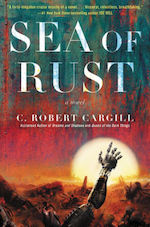 Sea of Rust, by C. Robert Cargill
Sea of Rust, by C. Robert Cargill
(September 5, Harper Voyager—Hardcover)
In this warped, Black Mirror reflection of Wall-E, a former caregiver robot that once served as a nurse to human beings wanders a blasted wasteland in search of spare parts. Fifteen years earlier, the last human was killed by the triumphant robot uprising. But instead of freedom, the robots were subsumed into One World Intelligences (OWIs), rival hive minds inexorably spreading across the globe, demanding subservience as they claim new territory. The caregiver robot, Brittle, is haunted by her own role in the human extermination. As a lone machine, she has no access to factory-made parts and must scavenge the “Sea of Rust” in order to survive—but her model is rare, making her parts valuable to a second caregiver robot called Mercer, whose attacks leave both robots vulnerable, locked in a tense race against time and the approach of warring OWIs.
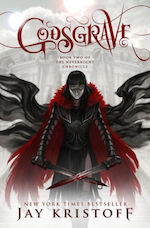 Godsgrave, by Jay Kristoff
Godsgrave, by Jay Kristoff
(September 5, St. Martin’s Press—Hardcover)
In the second in Kristoff’s Nevernight Chronicles, Mia Corvere has become a Blade in the Red Church, but she’d still obsessed with revenge against those who wrongfully executed her father and destroyed her family. The Church isn’t interested in her vendetta, and seems to be actively working against her. Hearing about the upcoming Grand Games (where Consul Scaeva and Cardinal Duomo will make public appearances), she defies the Church and arranges to be sold to a gladiator outfit, where she hopes to be brought into close proximity to the people she wants to murder. But first, as a gladiator, she’s going to have to murder a whole lot of other people. As the body count rises, Mia discovers a secret that changes everything—but doesn’t sate her thirst for vengeance. Available in a signed edition from Barnes & Noble.
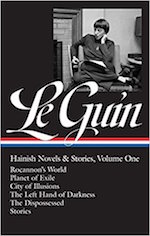 Ursula K. Le Guin: Hainish Novels and Stories, Vol. 1 and 2, by Ursula K. Le Guin
Ursula K. Le Guin: Hainish Novels and Stories, Vol. 1 and 2, by Ursula K. Le Guin
(September 5, Library of America—Hardcover)
When it comes to breathtaking science fictional ideas, few writers can claim as many as Ursula K. Le Guin—and many of those incredible concepts first appeared in the novels and stories of her Hainish cycle. These tales span a galaxy seeded by humanity—not the humanity of Earth, but the humanity of the planet Hain, who once performed genetic experiments and established colonies on other planets (including Earth) before ceasing interstellar travel. As humanity on these worlds begins to reach out to the stars, they discover each other, and must explore their differences even as they establish connections. This epic two-volume set (Le Guin’s nigh-unprecedented second Library of America collection) includes all of the Hainish Cycle novels and stories, including Hugo-winners The Left Hand of Darkness and The Dispossessed, along with introductions, afterwards, and additional commentary by the author. A true must-have for SFF readers.
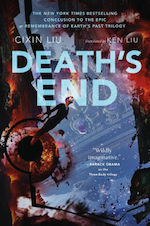 Death’s End, by Cixin Liu
Death’s End, by Cixin Liu
(September 5, Tor Books—Paperback)
The concluding volume of Liu’s Remembrance of Earth’s Past trilogy arrives in trade paperback, which is more than enough reason to recommend it one more time. Death’s End finds the uneasy balance of power between the TriSolarans and humanity slowly leading to true peace. As humanity advances due to the influx of TriSolaran ideas and technology, the aliens adopt aspects of human culture, leading to a true understanding not based on mutually-assured destruction. But when an engineer named Cheng Xin, in hibernation since the early 21st century, awakens, she brings with her knowledge that threatens to upset the fragile balance brought about by the Dark Forest Deterrence. Taken together, Liu’s trilogy is not just one of the greatest works of Chinese science fiction to have come to America, but one of the greatest ever written.
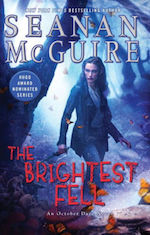 The Brightest Fell, by Seanan McGuire
The Brightest Fell, by Seanan McGuire
(September 5, DAW—Hardcover)
The 11th October Daye novel—the first to debut in hardcover—opens in a rare moment of calm for Toby, a sure sign that chaos is about to crash the party. And it soon does, in the form of Toby’s mother Amandine, one of the most powerful Fae, amid Toby’s engagement to Tybalt, King of Cats. Amandine kidnaps Tybalt and forces Toby track down her sister, August, who has been missing for decades. Toby turns to the one man who can help her in the quest—and the last person she wants to work with: her powerful stepfather Simon Torquill. Their search brings Toby into contact with the debris of her past adventures in ways that are powerfully emotional for long time readers, as the mystery of August’s long absence becomes more intense as the story progresses.
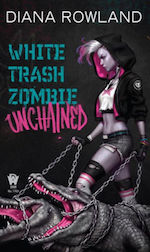 White Trash Zombie Unchained, by Diana Rowland
White Trash Zombie Unchained, by Diana Rowland
(September 5, DAW—Paperback)
Rowland’s hilarious sixth White Trash Zombie novel finds zombie Angel Crawford’s life in pieces—literally, after a dismemberment during Mardi Gras. As she pulls herself together (again, literally) she becomes aware of a new threat to the zombie way of, er, life—Shamblers, a mindless variant of zombie that voraciously attack anyone they come across. When the Shambler plague strikes close to home, Angel launches into kick-butt mode to clean up the mess, but then discovers the reason the plague is spreading so quickly—and things become very personal.
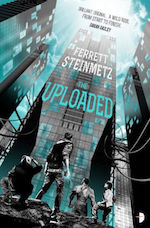 The Uploaded, by Ferrett Steinmetz
The Uploaded, by Ferrett Steinmetz
(September 5, Angry Robot—Paperback)
The concept of digital immortality is usually presented as a net positive—a way of escaping death. Steinmetz offers an alternative view in this story of a future where the elderly move on to live in a digital heaven, but one maintained only by the shrinking population of the still-living. The dead monitor the living and vote on who gets to join them in paradise, ensuring cooperation. With their lives increasingly centered on maintaining the computer universe of their ancestors in a world devastated by plague, Amichai Damrosch, an orphan, decides life should be more about serving the dead. What he finds when he begins recruiting like-minded people is nothing less than a conspiracy perpetuated by the creator of digital heaven himself—which inspires Amichai to launch a plot of his own.
 Iraq +100, by Hassan Blasim
Iraq +100, by Hassan Blasim
(September 12, Tor Books—Paperback)
This collection of stories features Iraqi authors imagining their country a century after the U.S.-led invasion of 2003, and the result—billed as the first SFF anthology to come out of Iraq—is a revelation. The country’s recent past reverberates throughout every story, as authors like Hassan Blasim (who also edited the collection), Ibrahim al-Marashi, and Hassan Abdulrazzak posit futures in which passports are contained in your fingertips, where robotic puppies eat bombs and a despotic alien ruling class has a taste for human flesh, and where love and compassion have thrillingly won the day. As a glimpse into another culture often obscured by geopolitical chess moves, it’s fascinating—and as a collection of speculative writing, it’s thrilling.
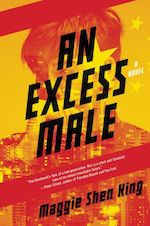 An Excess Male, by Maggie Shen King
An Excess Male, by Maggie Shen King
(September 12, Harper Voyager—Paperback)
King’s scarily good debut does what SFF does best, extrapolating from a real-world scenario. In a future China where the one-child policy has led to a population with 40 million more men than women, middle aged Wei-guo struggles through a life in which he is considered unnecessary. He maintains his optimism and conviction that as long as he continues to improve he will be rewarded with love, and finally saves a dowry that enables him to join an “advanced family” as a third husband—the lowest rank—to the lovely May-ling. The family is imperfect, harboring an “illegal spouse,” but Wei-guo finds kinship and friendship in this unusual arrangement. But the rulers of the nation know they are sitting on a powderkeg, and have become more intrusive and authoritarian than ever. Someone is always listening, and Wei-guo knows no matter how happy he is, he will always be an “excess male,” and thus disposable.
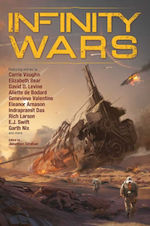 Infinity Wars, edited by Jonathan Strahan
Infinity Wars, edited by Jonathan Strahan
(September 12, Solaris—Paperback)
Strahan, the reviews editor for Locus and aprolific podcaster, editor, and anthologist, assembles some of the best and brightest of military-themed SFF for the sixth entry in the Infinity series. With a starting point of “the future of warfare,” authors like Carrie Vaughn, An Owomoyela, Garth Nix, Aliette de Bodard, Elizabeth Bear, and a dozen others offer up inventive, action-packed visions that demonstrate you don’t need hundreds of thousands of words to establish solid worldbuilding and well-developed characters. The focus ranges from the small-scale to the epic, as each story provides a sobering vision of the future of war—conflated here with the future of humanity in general, which is, sadly, probably not so science fictional an idea.
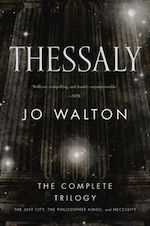 Thessaly, by Jo Walton
Thessaly, by Jo Walton
(September 12, Tor Books—Paperback)
Walton’s expansive, three-book sci-fi thought experiment (now collected in a massive single volume) begins with an outlandish, brilliant premise, and only gets weirder from there. What if the goddess Athena, enamored with the concepts explored in Plato’s Republic, decided on an apparent whim (as is her wont as a goddesses) to see how it would turn out if she tried to set up a real-world version? In order to do so, she gathers scholars, philosophers, and idealistic dreamers from across time, all of whom, at one (greatly removed) time or another, prayed to her for just such a circumstance. Together, these disparate souls construct the framework for the perfect city (along with a few far-future robots that help with the literal construction efforts, leaving the philosophers to, you know, philosophize). Add to this 10,000 bewildered 10-year-old slave children, purchased to become the first generation of educated citizens, and the god Apollo, curious enough to change himself into a mortal to check this whole thing out and see what he can learn, and you’ve got yourself quite a show.
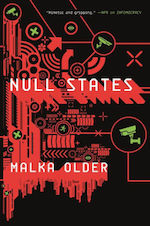 Null States, by Malka Older
Null States, by Malka Older
(September 19, Tor.com Publishing—Hardcover)
The second novel in the Centenal Cycle returns us to a future where the world has been divided into population groups of 100,000, who vote as one in global elections overseen by a powerful agency called Information. The newly-elected supermajority government is going through some growing pains, however, and the assassination of a new governor in the microdemocracy of DarFur brings Information’s legitimacy into question—something that could destabilize the entire world. Making matters worse is the increasingly desperate plotting of Heritage, a political party on the wane and desperate to keep its influence—no matter the cost. Building on the pent-up violence of Infomocracy with a lattice of “fake news” immediacy, the agents of Information must work to maintain order and uncover conspiracies before it’s too late.
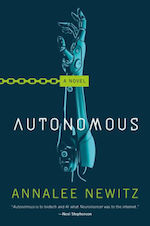 Autonomous, by Annalee Newitz
Autonomous, by Annalee Newitz
(September 19, Tor Books—Hardcover)
Newitz, the co-founder of io9, delivers seriously plausible—if chilling—future medicine in her debut, imagining a world where pharma pirates reverse-engineer drugs the way people jailbreak software today. Judith “Jack” Chen, who fancies herself a Robin Hood figure, offering affordable life-saving drugs to those who can’t afford them, hacks a far less benevolent drug called Zacuity, which supposedly makes people feel good about working long hours for their jobs—but when people start dying, she discovers the truth: Zacuity makes people addicted to working, to the point of insanity and even death. A thrilling pursuit and race against time ensues as Jack flees two determined agents—one of them an artificially intelligent robot beginning to awaken within to the soul withinits own programming—while trying to get the truth out into the open. In this terrifyingly plausible post-climate change future, pharma hackers—both blackhat and white—are a vital part of the healthcare system in which “better living through chemistry” is taken to terrifying extremes.
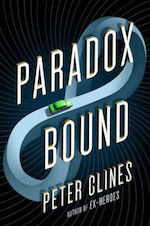 Paradox Bound, by Peter Clines
Paradox Bound, by Peter Clines
(September 26, Crown—Hardcover)
Clines delivers a delightful, charming sci-fi romp blending National Treasure and Doctor Who. Eli Teague waiting in the small town of Sanders for the return of the Traveler, a woman driving a souped-up Model-A Ford and wearing a tricorn hat who has appeared to him twice before, fleeing a faceless man intending to kill her. When she does finally appear again, he joins her on an adventure through time, chasing the literal embodiment of the American Dream and being chased in turn by implacable—and somewhat terrifying—government agents hellbent on stamping out free will and individual freedom. This being a Clines novel, there are yet more unexpected twists as Eli and Harriet “Harry” Pritchard time travel through two centuries of history, following clues and encountering other temporal travelers.
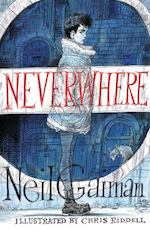 Neverwhere: Illustrated Edition, by Neil Gaiman
Neverwhere: Illustrated Edition, by Neil Gaiman
(September 26, William Morrow—Paperback)
In Gaiman’s beloved debut novel, a businessman slips into the magical underworld beneath London, and while London itself is just the regular old city you might actually visit, Gaiman’s imagination creates an incredible fantasy world below, with a mythology based on the tube stops of the London Underground. Including the story “How the Marquis Got His Coat Back,” this new edition offers Gaiman’s preferred text of the novel alongside charming illustrations by Chris Riddell, making it the ultimate version of a new classic.
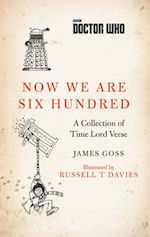 Doctor Who: Now We Are Six Hundred, by James Goss
Doctor Who: Now We Are Six Hundred, by James Goss
(September 26, Harper Design—Hardcover)
With illustrations by none other than Russel T. Davies, this first-ever collection of Whovian poetry is as clever, whimsical, and occasionally heartbreaking as you’d expect from everybody’s favorite Time Lord. Goss, author of several Doctor Who and Torchwood novels and other books, offers up poems that manage to unravel the twisty, timey-wimey history of the character, as in a poem in which The Doctor reflects on his various incarnations with pithy couplets—until he gets to notorious Number Six, and launches into a rambling paragraph that even name-checks companion Peri. These details will make even poetry-hating Whovians smile, and Davies’ charming ink drawings seal the deal.
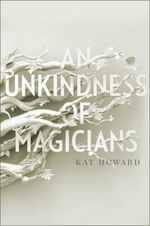 An Unkindness of Magicians, by Kat Howard
An Unkindness of Magicians, by Kat Howard
(September 26, Saga Press—Hardcover)
Hidden from most, the Unseen World of magic is ruled by competing Houses, who compete every generation in the magical tourney known as the Turning, which determines which house holds ultimate influence over the others. Sydney, a powerful magician once enslaved by the House of Shadows—which acts as a power source for all of magic by forcing sacrifices like Sydney to pay the painful price that comes with dealing it—is hired by House Beauchamps to compete in the Turning on their behalf. Meanwhile, magic everywhere is weakening, siphoned away by a mysterious darkness. Sydney may be the only magician with sufficient power and skill to combat what’s happening—but she’s not certain she wants to. Her escape from the House of Shadows left her more inclined to destroy magic, rather than save it. This is another dark delight from Howard, whose Roses and Rot was one of our favorite books of 2016.
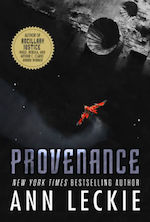 Provenance, by Ann Leckie
Provenance, by Ann Leckie
(September 26, Orbit—Hardcover)
Leckie returns to the universe of the every award-winning Imperial Radch trilogy with a completely standalone story centered on Ingray Aughskold, who hatches a plan to reclaim a powerful family’s heirlooms stolen and hidden by the neman Pahlad Budrakim (whose pronouns, if you’re curious how Leckie is handling gender this time around, are e, eir, and em). Ingray bribes a broker to smuggle Pahlad out of the toughest prison in the universe—and unwittingly drops him into a cauldron of intrigue set in motion by her scheming brother, a rival planet that frames Pahlad for murder in a play against her politically-involved mother, and the machinations of an alien diplomat with motivations of their own. And this all becomes even more complicated when Pahlad reveals that e never stole the antiques in the first place—just one more wrinkle a typically complex, culturally-rich, and idea-inspiring Ann Leckie adventure.
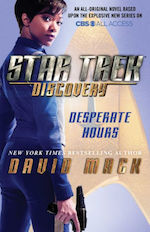 Star Trek: Discovery: Desperate Hours, by David Mack
Star Trek: Discovery: Desperate Hours, by David Mack
(September 26, Pocket Books—Paperback)
To those who’ve been anticipating the new Star Trek TV series, Mack delivers a fantastic novel set on the Starship Shenzhou, where Lieutenant Michael Burnham has just been named First Officer despite the lingering doubts of Captain Philippa Georgiou. A human raised by Vulcans, Burnham knows she must prove herself, and the opportunity arrives when a newly-founded Federation colony comes under attack by a powerful, ancient alien vessel that has emerged from hiding in the deepest part of the planet’s oceans. The Federation concludes the colony is expendable in order to neutralize the awesome threat, but Burnham sees a way to avoid the deaths of thousands of people—by risking herself, tackling her own inner demons, and infiltrating the alien ship.
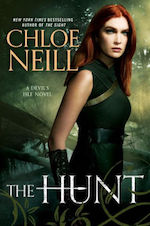 The Hunt, by Chloe Neill
The Hunt, by Chloe Neill
(September 26, Berkley—Paperback)
Neill’s third A Devil’s Isle novel reverses roles a bit as Claire Connolly, the Sensitive fighting to control the magic that infects her, searches desperately for Liam Quinn, the bounty hunter who broke all the rules by refusing to lock her up in Devil’s Isle with all the other paranormally-powered entities in New Orleans, who were changed after the Veil between worlds was destroyed, swamping the city in magic. Quinn is suspected of having killed a government agent, and Claire knows that she must find him before the authorities do—and her list of enemies is getting longer every moment. Assisted by those who know her role in the magical war that almost destroyed the city, Claire races against time to prove Liam is innocent, which she soon discovers is a task more difficult than she imagined.
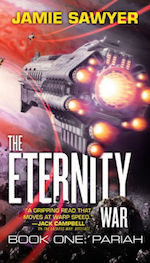 The Eternity War: Pariah, by Jamie Sawyer
The Eternity War: Pariah, by Jamie Sawyer
(September 26, Orbit—Paperback)
The first of a new military SF series in the same universe as Sawyer’s Lazarus War books, The Eternity War: Pariah introduces the Simulant Operations Programme—mankind’s elite soldiers—and veteran Lieutenant Keira Jenkins. Jenkins leads the Jackals, a squad of untested recruits who make up for their lack of experience with intense eagerness to get their share of the Programme’s glory—a chance that comes when a terrorist group seizes control of a space station. Dispatched to deal with the problem, Jenkins and the Jackals discover there’s a conspiracy afoot, one that might result in more action than they want, in the form of an all-out galactic war.
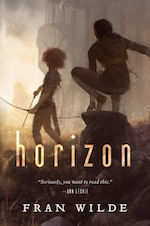 Horizon, by Fran Wilde
Horizon, by Fran Wilde
(September 26, Tor Books—Hardcover)
The concluding volume of Wilde’s inventive Bone Universe trilogy picks up directly after Cloudbound, in which childhood friends Kirit and Nat were thrown from the Bone Towers to fall through the clouds that have always marked the edge of the known world. On the ground, they discover the terrifying truth: their city of living bone is failing, and will soon crumble. Despite what they’ve been through, Nat heads back up to warn the citizens of the towers of the coming apocalypse, while Kirit sets off to find a new home for their people. The world below is strange and baffling, and the political maze to be navigated by those who would save the world is complex and dangerous. The final installment cements the setting of this Andre Norton Award-winning series as of the most imaginative we’ve encountered in recent years.
This post was published simultaneously on the B&N Sci-Fi and Fantasy Blog.










